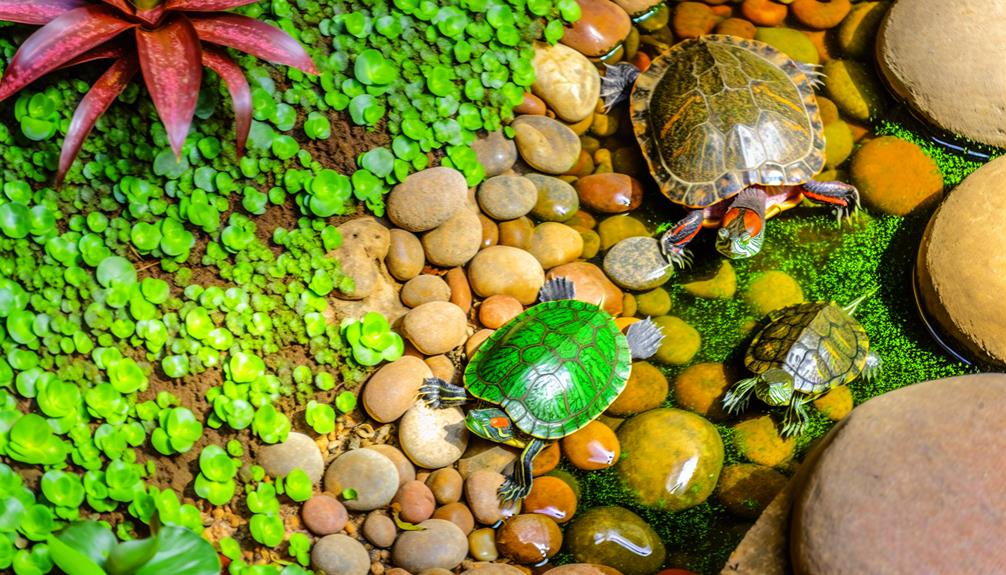Selecting the perfect pet requires understanding the unique traits and care necessities of different animals. Dogs offer unwavering loyalty, while cats provide an independent companionship ideal for busy lifestyles. For tranquility, consider fish, which enrich your environment with calmness. Birds bring vibrant energy and sociability, while reptiles require specialized care tailored to their unique habitats. Small mammals are affectionate additions, thriving in pairs. Assess your lifestyle, preferences, and the time you can dedicate to pet care to find the right match. There's much more to explore about these wonderful companions and their needs for a harmonious home.
Key Takeaways
- Consider Lifestyle: Choose a pet that fits your daily routine; dogs require more time for training and socialization, while cats and fish are more independent.
- Understand Care Needs: Each pet type has specific care requirements, including habitat setup, nutrition, and health monitoring; ensure you can meet these needs.
- Evaluate Space Requirements: Some pets, like reptiles and birds, need specialized habitats and larger spaces, while small mammals can thrive in smaller cages.
- Socialization and Interaction: Pets like birds and dogs benefit from regular social interaction, enhancing their emotional health and strengthening bonds with owners.
- Financial Commitment: Be aware of the financial responsibilities involved in pet ownership, including food, habitat, and veterinary care for your chosen companion.
Dogs: Loyal Companions

When considering a pet that embodies loyalty and companionship, how can one overlook the dog? Renowned for their unwavering devotion, dogs have secured their place as beloved family members across cultures and generations. Their capacity to form deep emotional bonds makes them ideal companions for individuals and families alike. To elevate your interactions with your furry friend, understanding how to communicate effectively is key; this not only enhances your bond but also helps develop your magnetic social skills in various aspects of life. To guarantee a fulfilling relationship with a dog, it is essential to invest time in dog training. Positive reinforcement techniques not only teach obedience but also foster trust and understanding between owner and pet. Training can enhance communication, leading to a harmonious living environment where both the dog and owner feel secure and content.
Equally important is the aspect of canine nutrition. A balanced diet tailored to a dog's specific needs lays the foundation for a healthy lifestyle. Proper nutrition supports not only physical well-being but also mental stimulation, which is vital for behavior and overall happiness.
Cats: Independent Friends
Cats, often regarded as independent companions, offer a unique blend of affection and autonomy that appeals to many pet owners. Their distinct personalities and intriguing cat behavior make them fascinating members of the family. Unlike dogs, cats thrive on self-sufficiency, allowing for a more relaxed companionship that can fit seamlessly into busy lifestyles. Additionally, understanding common issues that can arise, such as when they seem less interactive than usual, is vital for maintaining a healthy environment for your pet. Regular assessments of their behavior can help you identify any potential issues, such as fixing behavioral concerns.
Understanding feline health is essential for ensuring your cat's well-being. Regular veterinary check-ups and a balanced diet contribute greatly to their longevity and happiness. Here are some key aspects to take into account when welcoming a cat into your home:
- Space: Cats appreciate having their own territory to explore and retreat to.
- Routine: Establishing a consistent feeding and play schedule can enhance their behavior and reduce stress.
- Socialization: While they are independent, many cats enjoy interactive playtime and bonding with their owners.
- Mental Stimulation: Engaging toys and scratching posts can promote healthy activity and prevent boredom.
Fish: Tranquil Aquatic Pets

Fish offer a serene alternative to more interactive pets, providing a calming presence that can enhance any living space. Their mesmerizing movements and vibrant colors create a tranquil atmosphere, making them perfect companions for those seeking relaxation. A successful aquarium setup requires careful consideration of various factors, including fish varieties, water quality, and compatible tank mates.
Here's a concise overview of essential aspects of fish care:
| Aspect | Importance | Considerations |
|---|---|---|
| Aquarium Setup | Provides a healthy environment | Size, filtration, and decor |
| Fish Varieties | Different species offer varied experiences | Compatibility and behavior |
| Water Quality | Vital for fish health | pH, temperature, and regular testing |
| Feeding Habits | Guarantees proper nutrition | Species-specific diets and schedules |
Understanding breeding behaviors and monitoring for health issues are also essential for maintaining a thriving aquarium. Incorporating aquatic plants can enhance water quality while providing a natural habitat for your fish. By embracing the world of fishkeeping, you can cultivate a peaceful environment that enriches your home and fosters a sense of belonging.
Birds: Colorful Avian Companions
Birds are vibrant companions that bring joy and liveliness to any home, with popular species such as parrots, canaries, and finches enchanting pet owners worldwide. Additionally, just like the best flying mounts in Palworld, birds can provide a sense of freedom and adventure, making them unique pets. Understanding their care and maintenance is essential to ensuring their health and happiness, while recognizing their socialization needs can enhance the bond between birds and their owners. By exploring these aspects, potential bird enthusiasts can make informed decisions about welcoming these delightful creatures into their lives.
Popular Bird Species
Among the most enchanting companions in the pet world, popular bird species offer a vibrant array of colors, personalities, and vocal talents that can enrich any household. These feathered friends not only bring joy but also foster a sense of connection and companionship. When evaluating a bird as a pet, it's essential to understand their specific needs, including suitable bird habitats and the importance of parrot training for interactive species.
Here are some popular bird species to explore:
- Budgerigar (Budgie): Known for their playful nature and ability to mimic speech, they thrive in social environments.
- Cockatiel: These affectionate birds are known for their charming crests and gentle disposition, making them great family pets.
- African Grey Parrot: Renowned for their intelligence and conversational skills, they require dedicated training and socialization.
- Canary: A smaller option, canaries are appreciated for their beautiful songs and low-maintenance care.
Each of these species has unique characteristics that can complement any lifestyle, providing a loving addition to your home. Embrace the joy of avian companionship!
Care and Maintenance
Caring for colorful avian companions requires a thoughtful approach to guarantee their well-being and happiness. To begin, pet nutrition is essential; select high-quality seeds, pellets, and fresh fruits or vegetables to secure a balanced diet. Proper habitat setup is also important—provide a spacious cage, appropriate perches, and toys that encourage exploration and play.
Regular grooming essentials, such as nail trimming and feather care, help prevent health issues and promote comfort. Establishing effective training techniques early on can cultivate a trusting relationship and reduce behavioral problems. Incorporate behavioral enrichment by rotating toys and engaging in interactive activities that stimulate their natural instincts.
Health checkups with an avian veterinarian are critical for early detection of potential issues, ensuring your feathered friend remains in peak condition. It's important to take cost considerations into account, factoring in food, supplies, and veterinary care, to provide a sustainable environment for your pet. Finally, if you're contemplating adoption, research bird species to find a match that fits your lifestyle and commitment level. With dedication and love, your colorful avian companion can thrive, bringing joy and companionship to your home.
Socialization Needs and Benefits
Socialization plays an essential role in the overall well-being of colorful avian companions, greatly influencing their behavior and emotional health. Engaging in social interaction with both humans and other birds helps foster a sense of belonging and security. By employing effective training techniques, pet owners can enhance their birds' social skills, leading to positive companionship impacts.
The emotional benefits of socialization cannot be overstated. Birds that interact regularly demonstrate improved activity levels and display more adaptive behavioral signals. When considering the social needs of your avian companion, keep the following in mind:
- Encouraging Play: Provide toys and opportunities for interactive play.
- Regular Handling: Spend time gently handling your bird to strengthen pet bonding.
- Group Dynamics: If feasible, consider a multi-bird environment to promote natural social behaviors.
- Consistent Routine: Establish a routine that includes social interaction to foster stability and trust.
Reptiles: Unique Exotic Pets

While many people gravitate towards traditional pets like dogs and cats, reptiles offer an enchanting alternative for those seeking unique exotic companions. These extraordinary creatures, ranging from colorful chameleons to majestic iguanas, have distinct personalities and fascinating behaviors that can captivate any animal lover. Just like students benefit from personalized learning experiences through adaptive technology, reptiles thrive in environments that cater to their specific needs, emphasizing the significance of tailored care. the science behind adaptive learning
Choosing to bring a reptile into your home means committing to an understanding of their specialized needs. Proper reptile habitats are essential for their health and wellbeing, often requiring specific temperature gradients, humidity levels, and UV lighting to mimic their natural environments. Creating a comfortable home for your reptile not only enhances their quality of life but also fosters a deeper bond between you and your new companion.
Moreover, reptiles often have exotic diets that can vary considerably from one species to another, including insects, fruits, or specialized pellets. Providing the right nutrition is fundamental for their growth and vitality, and it further emphasizes the responsibility that comes with pet ownership.
For those willing to embrace the challenges, reptiles can be rewarding companions that offer a sense of uniqueness and belonging, enriching the lives of their owners with their intriguing presence.
Small Mammals: Cuddly Critters
Small mammals, with their endearing personalities and soft fur, have captured the hearts of pet enthusiasts around the world. These delightful companions, ranging from rabbits to guinea pigs, offer unique interactions that foster a sense of belonging. Understanding small mammal care and providing ideal habitats is vital for their well-being, especially when considering the various ways to enhance their living environments and interactions, as highlighted in exploring essential tips.
When considering a small mammal, keep the following tips in mind:
- Cage Size: Guarantee an appropriate living space that allows for movement and play.
- Diet: Provide a balanced diet rich in hay, fresh vegetables, and pellets tailored to their species.
- Socialization: Many small mammals thrive with companionship, so consider adopting pairs to enhance their happiness.
- Environmental Enrichment: Include toys and hiding spots to stimulate their natural behaviors and keep them engaged.
Creating a nurturing environment not only supports the health of these cuddly critters but also strengthens the bond between you and your pet. Small mammals can bring immense joy and companionship, making them ideal choices for those looking to nurture a loving relationship with a furry friend. Embrace the joy of small mammal ownership, and let these charming creatures enrich your life.
Frequently Asked Questions
What Is the Average Lifespan of Different Pet Types?
The average pet lifespan varies considerably due to species differences. For instance, dogs typically live between 10 to 15 years, while cats may reach 15 to 20 years. Smaller pets, such as hamsters, usually have a lifespan of 2 to 3 years, whereas birds can live 10 to 30 years, depending on the species. Understanding these variations in pet lifespan is essential for prospective owners to guarantee a loving and lasting companionship.
How Much Time Should I Dedicate to Pet Care Daily?
Effective pet care requires a commitment of time that varies based on the type of pet. Generally, dedicating at least 30 to 60 minutes daily is advisable, encompassing feeding, grooming, training, and playtime. Establishing daily routines fosters pet bonding, enhancing the relationship between you and your companion. Regular interactions not only promote emotional well-being for your pet but also create a fulfilling experience for you, reinforcing the sense of belonging within your household.
Are There Hypoallergenic Pet Options Available?
Yes, there are hypoallergenic pet options available for individuals who suffer from pet allergies. Hypoallergenic breeds, such as Poodles, Bichon Frises, and certain terriers, are known to produce fewer allergens compared to other breeds. While no pet is entirely allergen-free, these breeds can greatly reduce the likelihood of allergic reactions. Choosing a hypoallergenic pet allows individuals to experience the companionship and joy of pet ownership while managing their allergy concerns effectively.
What Are the Costs Associated With Owning Various Pets?
Owning a pet involves several financial considerations, including an initial investment for adoption or purchase fees. Ongoing expenses encompass food costs, pet supplies, and routine veterinary care, which can vary greatly by species. Furthermore, it's prudent to allocate emergency funds for unexpected health issues. Understanding these costs is essential for prospective pet owners, fostering a sense of responsibility and belonging as they prepare to integrate a beloved companion into their lives.
How Do I Choose a Pet That Fits My Lifestyle?
Choosing a pet that fits your lifestyle involves evaluating both your daily routine and the pet's personality. Consider factors such as activity level, grooming needs, and social tendencies. Reflect on how much time you can dedicate to companionship and care, as well as your living situation. A harmonious match between your lifestyle compatibility and the pet's unique traits fosters a fulfilling relationship, ensuring both you and your future companion thrive together.




